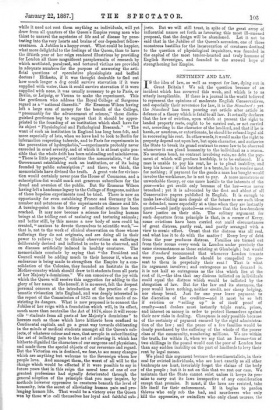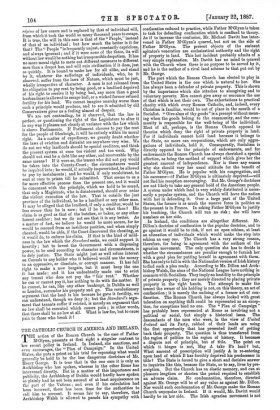SENTIMENT AND LAW.
IS the idea of law, as well as respect for law, dying out in Great Britain? We ask the question because of an incident which has occurred this week, and which is to us utterly inexplicable. If there is a journal in the world believed to represent the opinions of moderate English Conservatives, and especially their reverence for law, it is the Standard: yet the Standard has been pouring out article after article in defence of a theory which is fatal to all law. It actually declares that the law of eviction, upon which at present the right to landed property rests, ought to be carried out, or not carried out, according to the character of the landlord, and that if he is harsh, or usurious, or extortionate, he should be refused legal aid in recovering his rent. In other words, it would make the right to property depend not upon law, but upon character, and authorise the State to break its grand contract to cause law to be observed whenever it can plead humanity to the individual as a reason. No usurious bond, no contract involving ruin, no debt the pay- ment of which will produce hardship, is to be enforced. If a man is unable to pay his rent, he is to plead inability, and keep his house ; if his butcher is a brute, he is to receive meat for nothing ; if payment for the goods a man has bought would involve the workhouse, he is not to pay. A more monstrous or unworkable theory, or one more hostile to the interests of the poor—who get credit only because of the law—was never broached ; yet it is advocated by the first and ablest of all Conservative papers published in English. It is enough to make law-abiding men despair of the future to see such ideas so defended, more especially at a time when they are instantly quoted—and justly quoted—as evidence that the law-breakers have justice on their side. The solitary argument for such departure from principle is that, in a corner of Kerry, f some evictions have been carried out amid circumstances of great distress, partly real, and partly arranged with a view to scenic effect. Grant that the distress was all real, and what has it to do with the matter ? Every levy of debt from the poor produces distress. Families are turned out from their rooms every week in London under precisely the same circumstances as those existing at Glenbeigh ; but would the Standard recommend that whenever London tenants were poor, their landlords should be compelled to pre- sent to them in perpetuity their rent ? That is what its argument involves ; and outrageous as that demand is, it is not half BO outrageous as the idea which lies at the root of it,—the idea that any distress inflicted on individuals could equal the distress which would be inflicted by the abrogation of law. But for the law and its sternness, the poor would have nothing, neither credit, nor cheap lodging, nor cheap bread. Just for one year leave payment to the discretion of the creditor—and it must be so left if eviction or "selling up" is of itself proof of cruelty—and dealers must instantly triple rents, prices, and interest on money in order to protect themselves against their new risks in dealing. Cheapness is only possible because of the certainty of payment ensured by the rigid administra- tion of the law ; and the peace of a few families would be dearly purchased by the suffering of the whole of the poorer class of the community, numbering millions. We are within the truth, far within it, when we say that an Income-tax of two shillings in the pound would cost the poor of London less than any sudden inability on the part of landlords to levy their rent by legal means.
We plead this argument because the sentimentalists, in their zeal for evicted individuals, who are hurt exactly as all other bankrupts are hurt, invariably forget the claims of the body of the people ; but it is not on this that we rest our case. We maintain that the State cannot exist unless it keeps its pro- mise to carry out its laws irrespective of any consideration except that promise. It must, if the laws are resisted, take life itself for their enforcement. If it begins to pardon thieves who only rob the bad, and murderers who only kill the oppressive, or swindlers who only cheat usurers, the Conservatives gives us a feeling almost of despair.
a matter of fact, we believe he would be more secure, for he In Ireland, the conditions are altogether different. Mr. would be rescued from an invidious position, and when simply Dillon's doctrine of confiscation is the popular doctrine, and to cheated, would be able, if the Court discovered the cheating, as go against it would be to risk, if not an open schism, at least it would do, to enforce his claim. If that is the kind of mild- an alienation of individuals which would make the step into ness in the law which the Standard seeks, we could support it schism an easy one. The Church has a very strong reason, heartily ; but to invest the Government with a dispensing therefore, for being in agreement with the authors of the power, to be used according to character and circumstances, is agrarian movement. The only question she has to decide is to defy justice. The State might just as well refuse interest whether the circumstances are peculiar enough to furnish her on Consols to any holder who it believed would use the money with a good plea for putting herself in agreement with them. in an oppressive, or dissolute, or corrupt manner. It has full She has only to fall in with the Nationalist version of Irish history right to make a new bargain, but it must keep the one to find such a plea ready. According to Mr. Dillon and Arch- it has made; and it has undoubtedly made one to evict bishop Walsh, the aims of the National League have nothing in any tenant who does not pay the "fair rent." Whether common with Socialism. They imply no hostility to the principle he can or cannot pay it, has nothing to do with the matter. If of private property ; they are merely directed to placing private he cannot, he can, like any other bankrupt, in Dublin as well property in the right hands. The attempt to make the as London, surrender his property and go. The revolutionary tenant the owner of his holding is not, on this theory, an act of argument that the land is his because he gave it fertility, we confiscation ; it is merely the undoing of a former act of con- can understand, though we deny it ; but the Standard's argu- fiscation. The Roman Church has always looked with great ment that tenants suffer if evicted, is merely an argument that toleration on anything that could be represented as an excep- no law shall be executed which causes pain ; in other words, tion, for exceptions bind no one. The "Plan of Campaign" that there shall be no law at all. What is law for, but to cause has probably been represented at Rome as involving not a
pain to those who break it ? political or social, but simply a historical bale. The



































 Previous page
Previous page